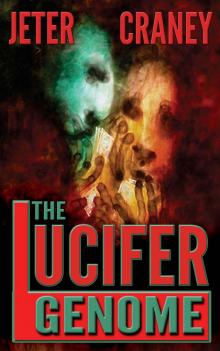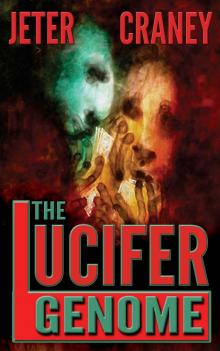- Home
- Glen Craney
The Fire and the Light Page 4
The Fire and the Light Read online
Page 4
“As did the Master Jesus,” said Castres.
“The Bible doesn’t say that,” said Esclarmonde.
“You have studied the Roman version, not the true story.”
How did he know of her secret studies? Aided by the Marquessa’s complicity, she had read the gospels many times, but she had told no one except Corba. “My missal was copied from the abbot’s tome at Montserrat,” said Esclarmonde, bristling at the dismissal of its value. “My godmother paid good coin for it.”
Castres pulled an ancient scroll from his knapsack and his followers gathered round him to shield it from the sparks. The frayed parchment was covered by a script of angry-looking letters whose terminals were flourished like the tips of scimitars. “The Gospel of the Righteous Teacher,” said the Cathar bishop. “Written by the eldest brother of the Master.”
Esclarmonde scoffed at that claim. “Our Lord had no brothers.”
Castres sighed wearily. “The Master’s Nasorean followers smuggled this gospel from Jerusalem before the impostor Saul could destroy it. What you have been taught, my child, is the false rendering of the Antichrist.”
“Why haven’t you taken it to the Holy Father?” Esclarmonde asked.
Castres pressed his hands together in a gesture meant to forgive her naïve suggestion. “There are many things you will come to understand. This is the only remaining evidence of what truly happened in those blessed days. If the Whore of Rome gains possession of it—”
Lights flickered below the ledge, followed by voices echoing up from the rotunda. The Cathars scattered into the dark corners. Castres hid the scroll under his robe and whispered, “If I am taken, this gospel must be saved.”
This heretic monk was very strange, thought Esclarmonde, but he seemed prepared to give his life for what he believed. Had God revealed the nimbus to her as a sign of his holiness? After debating the risk, she confided, “My father once told me of another entrance.”
“We are at your mercy,” said Castres.
As the voices came closer, Corba pulled Esclarmonde aside. “If we get caught with them, the priest will send us to Toulouse!”
“We can’t leave them here to die,” said Esclarmonde.
“What do you intend to—”
Esclarmonde crawled to the end of the ledge. The ladder moved from the weight of a climber. She pushed it off. A moan came from below, punctuated by a curse. Having gained a few seconds at most, she hurried back to the Cathars and felt a tug. She feared she had ripped her skirt, but there was not enough light to inspect the damage. She led the heretics deeper into a fissure and soon came to a fork with branching tunnels. “The Devil always takes the left-hand path?” she asked. Reassured by Castres’s nod, she chose the tunnel on the right. “They’ll expect unbelievers to take the sinistral way.”
Corba and the Cathars followed in single file on hands and knees. After several minutes, the passage narrowed, forcing Esclarmonde to abandon the torch and crawl on her belly. The tunnel became so impenetrable that she could not see her hands. Was this the same route her father had taken years ago? She turned onto her back and slid headfirst, sensing what it must feel like to be buried alive. The smell of sulfur and bat guano stung her nostrils.
Panic swept over her—she was stuck.
Castres brushed her foot. “Breathe slowly, my child. Turn within.”
His touch inexplicably calmed her. She exhaled slowly, and the walls gave way just enough to unlock her foot. She kicked forward, and after several more lengths, the walls flared. Her arms were freed sufficiently to allow her to turn onto her stomach. Moist air attacked her face. She heard gurgling. Silver rippling reflected in the blackness below her. Cave crickets buzzed her ears and the blackness stirred with scorpions. They had reached an underground stream.
“We have to jump,” she whispered. “Tell the others.”
Distraught over the fate of his scroll, Castres ran his hand across the wall and found a crevice. He hid the parchment and covered it with rocks.
Esclarmonde offered up a silent prayer and dived blindly into the stream. Her foot came down hard on the bottom—a bolt of pain shot through her ankle. She almost blacked out until a splash near her head revived her. Cries were followed by the thuds of bodies hitting the black water. Arms grabbed at her neck and dragged her down. She surfaced with Corba clinging to her shoulders. Together they struggled to keep their heads above water as the stream hurled them through the darkness.
Phillipa patiently awaited her turn to jump. Hearing no voices behind her, she assumed that she was the last in line. When the Cathar man in front leapt into the water, she prepared to push off and—
A rope snared her foot and dragged her back through the tunnel. Two soldiers wrestled her to submission and wrangled her down into the rotunda. They threw her next to another captured Cathar named Sacchioni. A knight wearing a white mantle with a red cross limped out from the shadows and angrily kicked the fallen ladder.
“Montanhagol?” Raymond de Perella held up a torch to inspect his compatriot’s bloodied shin. “Are you injured?”
“I’ll roast the devil’s whoreson who shoved that ladder!” Guilhelm grasped Phillipa’s chin and pulled her face into the light. “How many were with you?”
Phillipa trembled with fear, but she remained mute.
“They never talk,” said Raymond. “Come. We’ll deliver them to Toulouse and be done with this damnable business.”
While the two prisoners were herded toward the cave’s entrance, Guilhelm climbed the ladder again to make certain that no other heretics were cowering on the upper level. Finding none, he prepared to descend when he saw a piece of green cloth hanging from a jagged rock. He retrieved the swath and sniffed it. The scent was oddly familiar. Perplexed, he looked down at Phillipa as she was led away and saw that she had been watching him intently. When she averted her eyes with a look of knowing guilt, he became suspicious.
Raymond discovered him lingering behind. “What have you found?”
Guilhelm hid the cloth in his fist. “Nothing.” He waited until Raymond had turned back and then displayed his discovery to Phillipa. He shook his head in a warning that she should never speak of their mutual secret.
Esclarmonde came to consciousness coughing up water and shaking with nausea from the pain in her swollen ankle. The Cathars carried her to a grassy clearing near a stream that emerged from the mouth of the underground cavern. She recognized the landscape—they had been deposited nearly half a league from the entrance to Lombrives.
Corba lifted Esclarmonde’s head. “Are you hurt?”
“I fear my foot is broken.”
Castres gently cradled Esclarmonde’s ankle in his ancient hands while speaking prayers over it in a foreign-sounding tongue. The other Cathars placed their hands over her heart and joined him in the incantations. Soon she felt a balm of heat course through her foot. She searched the faces hovering over her and discovered one missing. “The girl?”
Castres shook his head, fighting back tears. “Our dear Phillipa did not receive the last rites. She will be forced to incarnate again into this world. Three others from my flock have also been lost.”
Hunting horns blared in the distance.
“You must get away!” warned Esclarmonde. “I’ll come back in the morning with food and clothing.”
“You will not!” insisted Corba.
“They’ll starve out here.”
“You’ve done enough, child,” agreed Castres. “If the Roman churchmen discover that you’ve helped us, your family will be in danger.”
Esclarmonde pushed to her elbows and struggled to her feet. She took a tentative step—the pain had eased. Stunned, she embraced Castres in gratitude for the healing miracle. “Where will you go?”
“If the God of Light so wills, our paths will one day cross again.” Castres looked up at the skyline to memorize the location. “What is this place called?”
“Niaux cave,” said Esclarmonde.
Castres
delayed as if wishing to tell her something more, but he had no time. He hurried with his flock to the protection of the trees only moments before the Foix men galloped over the horizon.
Roger caught sight of the girls and spurred to a charge, shouting, “By God, I’ll have you both thrashed!” He reined up his sweating steed and stared incredulously at their drenched clothing. “Where in Hell’s name have you been?”
“We went swimming,” said Esclarmonde, shivering.
Roger stared at her as if questioning her sanity. “Swimming? We’ve been searching two hours for you!”
Esclarmonde knew from hard experience that the best tactic in such a predicament was to throw her brother on the defensive. “I am the viscountess of this domain.”
Roger screwed his face into a knot; he did not need to be reminded yet again that, under Occitan law, this forest had descended to Esclarmonde through the tradition of matrilineal descent. “What does that have to do with—”
Esclarmonde ripped a bundled cloak from Roger’s saddle and draped it over her shoulders. “I shall inspect my holdings in any manner I choose. Now stop sitting there like a boorish philistine. Provide us your horses.”
Roger was still trying to understand how the two girls had swum so far from the clearing. He dismounted in a cloud of confusion and assisted her onto the saddle. Another knight offered his stallion to Corba.
In a weak protest, Roger warned, “Don’t overtax the—”
Esclarmonde lashed the lathered horse toward Foix. When she had gained a safe distance from the men, she turned to Corba with a shaken glance. Both knew that this day had seen the last of their girlhood idylls.
Read this little book, then, not as one seeking to take up the life of a lover, but that, invigorated by the theory and trained to excite the minds of women to love, you may, by refraining from so doing, win an eternal recompense and thereby deserve a greater reward from God.
- Andreas Capellanus, De Arte Honeste Amandi
III
Foix
May 1194
As Vespers came to a close, the sleepy villagers filed out through the rear doors of St. Volusien’s Lady Chapel. Esclarmonde arose slowly from the front kneeler, extending her prayers so that she would be the last of the congregants to depart. The distant splash of holy water confirmed that the priest had retreated into the sacristy. She lingered a few steps behind the others and eased the doors shut in front of her. Alone in the dark chapel, she retraced her steps and felt her way along the wall until she found one of the Stations of the Cross: Christ was being nailed to the beams. The altar, she calculated, was only a few paces away.
After her contretemps in the Court of Love, the Bishop of Toulouse had confiscated her missale plenum. Fortunately, he did not inquire as to how she had come into possession of the rare compilation of gospels and epistles. During his service to the Cross, her father had become an admirer of Eleanor of Aquitaine, the erudite wife of King Louis. Detecting the same precocious talent for letters in his daughter, the elder Count of Foix had secretly employed a Catalan Latinist from Montserrat to catechize Esclarmonde in the trivium of Latin grammar, rhetoric, and dialectic. After the Count’s death, the Marquessa had continued the private tutelage, but with suspicions recently aroused, she deemed it prudent to terminate the monk’s services with an annual benefice conditioned on his promise never to divulge the arrangement.
Esclarmonde, however, would not be so easily thwarted. She remembered that the parish priest often left his breviary on the altar for dawn service rather than lock it in the vestibule library. Although it was rare for the village clerics to sing their Office in public, Father Jean was so proud of his voice that he would open the chapel on Sunday evenings and permit the parishioners to sit in and admire his chant.
Bone-weary from the chase that afternoon, she was nevertheless determined to find evidence of the heretic bishop’s assertion that Jesus had possessed an older brother. Why had she not been told of this brother’s existence? And how could the Blessed Mother have been a virgin? She crawled down the side aisle to avoid being seen should the priest return. A few coals still flickered in the hand-warming dish. She lit the candle that she had hidden under her cloak and followed the eyes of the pedestaled Madonna toward the altar.
The breviary was still on the lintel—with its clasp unlocked.
She held the candle above the tome and turned to the first gospel. The historiated calligraphy was in a strange hand, most likely from a northern abbey. It had never occurred to her that two versions of Holy Writ could appear so different. She pored over the Latin, slowly gaining speed, but she found nothing about Our Lord having a brother. If St. Matthew made no such reference, certainly none of the other saints would have done so. The words of Scripture were divinely inspired. God was neither forgetful nor inconsistent.
The Cathar hermit was exposed as a falsifier. Disillusioned, she prepared to leave when a dollop of hot wax dripped onto her hand. She stifled a scream—her elbow knocked the breviary from its perch. She snuffed the candle and hid behind the altar. When the priest did not return, she thanked the Madonna for the protection and relit the candle. The tome had landed face down. She turned it aright and was confronted by a passage from St. Mark:
He went away from there and came to his own country; and His disciples followed him. And on the Sabbath He began to teach in the synagogue; and many who heard Him were astonished, saying, “Where did this man get all this? What is the wisdom given to him? What mighty works are wrought by his hands! Is not this the carpenter, the son of Mary and brother of James and Joseph and Judas and Simon, and are not his sisters here with him?”
Four brothers, and sisters, too? She read on:
And they took offense at Him. And Jesus said to them, “A prophet is not without honor, except in his own country, and among his own kin, and in his own house.”
How could Christ’s own family not believe in Him? And why had St. Mark recorded such an important incident when the other saints had not? She could not remember seeing these passages in her own copy of Scripture. The scribe at Montserrat may have considered them too blasphemous to record. Her thoughts turned to the many arguments that she had waged with Roger. The same blood in siblings, she knew, could run hot and cold. But Our Lord had worked miracles in His own family’s presence. Why had they not accepted His teachings? She reread the passage to make certain the Devil was not playing tricks. Perhaps this passage was the amendment of a renegade scribe. If this James did in fact disown Jesus, why would he have felt the need to write his own gospel? And why was it not included in the New Testament? Whom could she consult about this? The Marquessa had no expertise in theology. The local priest might report such an inquiry to Toulouse. She had to find the old Cathar mystic again. She turned to leave and saw a shadowy figure standing at the far end of the aisle. With trepidation, she raised the candle for more light.
“Father?” she asked.
Through the murk of incense, Folques took an unsteady step toward her. His unshaven face was the sickly color of cider pomace and his black eyes swam with pain. In a hoarse voice, he rasped, “It was not my intent to frighten you.”
Recovering from the fright, Esclarmonde cursed her carelessness in failing to bolt the rear doors. “Is it your practice, sir, to remain in the shadows of a closed church while eavesdropping on a lady’s private supplications?”
“You are not the only one who seeks spiritual comfort,” said Folques. “And from my vantage, you were doing more reading than praying.”
“I thought you had departed Foix weeks ago.”
“I came here this night to petition a miracle. The novena was still warm on my lips when you appeared before me like an angel.”
“A miracle? For what purpose?”
He captured her hand. “I beg you hear me out. I am trained in locution, but I know not how to commence. Sleep has abandoned me since I failed you.”
She glanced nervously at the sacristy door. “Please, lower your voic
e.”
“I ask only to be given another chance. The court at Puivert convenes next month. I shall raise you to the heavens with song so bold that all shall forget my abject fall from grace.”
She drew him toward the rear of the chapel to prevent the priest from overhearing. “We must not be found here.”
“I care not who hears me! I’ll scream it to the world!”
She gathered a shallowing breath for resolve. “Sir, I owe you an apology. I accepted your attentions without regard to the consequences. I cannot continue to give you hearing.”
Folques descended to his knees. “I live only for you! A sign of your affection is all—”
“Please, no ... I have no feelings for you.”
The troubadour’s face turned slate with harsh accusation. “You are not betrothed! What has caused this sudden change of heart?” He tightened his grip on her wrist. “That Templar has beguiled you!”
“You do me grave injustice!”
“I saw your heated glances at him!”
“I will not be interrogated!”
Folques arose in a pique and circled her. “There are rumors of a sordid history with that ogling celibate.”
She tried to escape, but he blocked her path.
“Are you not curious why the monk no longer fights the infidel?”
“Enough!” she screamed, forgetting the proximity of the sacristy.
Folques stepped back, repulsed by her raw fury. He stood aside and left her an opening toward the doors, then smiled grimly when she refused to leave without hearing the rest of his report. “Montanhagol was assigned to guard the King of Jerusalem. During his watch, assassins infiltrated the royal confines and cut out the monarch’s heart. As punishment, the Lionhearted ordered the Templar’s beard be sheared. The Grand Master banished from Palestine.”
In truth, she had found the Templar’s breach of custom passing strange, for it was common knowledge that the monk warriors were required to wear beards, even in the stifling heat of the desert. This information would have been of great value to her that day at the court.

 The Lucifer Genome
The Lucifer Genome The Twelfth Tribulation: A Short Story of the American Civil War
The Twelfth Tribulation: A Short Story of the American Civil War The Lucifer Genome: A Conspiracy Thriller
The Lucifer Genome: A Conspiracy Thriller The Spider and the Stone: A Novel of Scotland's Black Douglas
The Spider and the Stone: A Novel of Scotland's Black Douglas The Fire and the Light
The Fire and the Light The Twelfth Tribulation
The Twelfth Tribulation